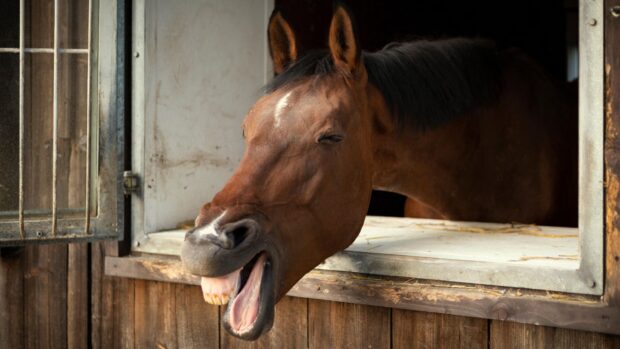If you hack regularly on roads or public bridleways, sooner or later you will inevitably come across a fly-tip, an illegal waste dump on public or private land. Fly-tips are unsightly and potentially dangerous to health, the environment, and wildlife. They also pose a risk for riders, as they might contain sharp objects that might injure a horse, or bizarre objects like washing machines or mattresses that might cause a horse to spook.
Verges and private field gate entrances are common fly-tip sites, so anyone who has their own fields might discover one on their land. With roughly one million fly-tipping incidents reported in England last year, 60,000 reported in Scotland, and 38,000 reported in Wales, you are almost certain to encounter one at some point.
However, you don’t need to merely roll your eyes and keep riding, despairing at the callousness of humanity. You can be proactive, and in fact, you should, because the only way local authorities can take action against fly-tipping is if people report it, as the police or council can’t be everywhere. A spokesperson for Zero Waste Scotland said: “We would always encourage people to report fly-tipping, either to our dedicated Dumb Dumpers website and hotline or to their local authority. If the act is still taking place, you can also call the police but only if you can do so safely — never put yourself at risk by intervening.”
They added: “With tens of thousands of incidents a year in Scotland, the cost to the public purse of clearing up fly-tipping reaches into the millions. Fly-tipping isn’t just antisocial and bad for our environment — with fines of up to £40,000, it is not worth the risk.”
If you are in England or Wales, you should report it your local council, or if it is a large amount of waste or contains hazardous materials such as chemicals, needles or asbestos, contact the Environment Agency hotline at 0800 807060. Wales also has a dedicated website, where incidents can be reported. Most councils have fly-tip webpages or hotlines, and if you’re not sure which local authority you should report to, this website enables you to type in the postcode and find out. If you are in Northern Ireland, the local council is also the first port-of-call, but the NI Direct website has helpful information and easy-to-follow instructions on what to do.
It is the responsibility of private landowners to dispose of waste left on their land, however, Keep Britain Tidy counsels: “Report the incident to your local authority or the Environment Agency. Although they have no obligation to remove the waste, they may be able to provide guidance on the best way to deal with the removal of the waste.”
They should investigate the incident and if possible, take enforcement action, but unfortunately for the landowner, they won’t clear it free of charge. The National Fly-Tipping Prevention Group advises that landowners carefully document the waste and keep full details of their disposal cost, as the costs of its removal can be recovered if there is a successful prosecution.
Landowners can also take steps to make their land less vulnerable to fly-tippers. The National Fly-Tipping Prevention Group recommends taking the following steps:
1. Restricting access to your land by installing gates or physical barriers (strategically placed earthbunds, tree trunks, boulders etc.) to prevent access to the land ideally in keeping with the natural environment. Make sure that when erecting any form of barrier you are not permanently blocking a public right of way.
2. Make sure gates are closed and, if possible, locked when not in use.
3. Improving visibility so that fly-tippers are not hidden from view. Fly-tippers prefer to commit their crimes out of sight.
4. Install or improve lighting if possible.
5. Consider placing appropriate deterrent signage and CCTV cameras.
6. Swiftly clear any waste that is dumped to remove any encouragement for others to add to it.
Of course, the burden should be on the perpetrators of fly-tipping to not do it in the first place, and on the local authorities to enforce it. Fly-tipping is a criminal offence, imposing penalties from an £80 to £200 fixed penalty notice (in Scotland) or £120 to £400 (in England and Wales), to five years in prison, depending on the scale of the offence. Additionally, Scotland, England, and Wales have all made the fixed penalty notices enforceable against householders who have passed their waste onto someone else without exercising ‘duty of care.’ That means the householder should check with SEPA or their local authority to make sure anyone they have hired to remove household waste is a registered waste carrier.
According to Keep Britain Tidy: “Too many householders are unaware that they need to ask for a waste carriers license when handling waste for a third-party disposal.”
All councils in the UK charge for commercial waste disposal, and the expansion of the scope of FPNs is an attempt to discourage householders from using carriers who are more likely to fly-tip than pay for proper disposal.
The government is also attempting to tackle fly-tipping through education.
Zero Waste Scotland said: “[Householders and tradesmen] also need to know what options are available to them for getting rid of excess household waste and bulky items, for example by arranging for them to be uplifted by the council or picked up free of charge through the Re-Use Line.”
Most councils throughout the UK provide some sort of uplift service, although some charge and some don’t. Private householders in Scotland, however, can generally dispose of their bulky items for free at council-run tips. Since 1990, the Scottish government has required local authorities to provide free-to-use waste recycling centres for their residents. In England and Wales, however, whether or not a recycling centre is free is down to the individual council, and the BBC reported last year that six out of the 10 local authorities which experienced the biggest rise in fly-tipping in 2017 charge householders to take some types of rubbish to the tip.
Mapping incidents is also part of the strategy for keeping the countryside clean. Zero Waste Scotland said: “We are also working to develop our evidence base through FlyMapper, the national reporting tool for land managers in Scotland. It was developed in in partnership with SEPA, Fly-tipping Action Wales and a Local Authority User Group. The majority of Scottish Local Authorities are now using FlyMapper to record and map fly-tipping incidents in their area which is helping to establish a baseline for fly-tipping in Scotland and develop effective prevention and enforcement interventions at local and national levels. By developing a strong evidence base, we will be able to develop solutions that will help to influence the culture and behaviour of those engaged in fly-tipping.”
For England and Wales, DEFRA has been tracking incidents on WasteDataFlow, which a 2018 House of Commons briefing paper on fly-tipping describes as: “a web-based system for municipal waste data reporting by UK local authorities to government.”
For all the latest equestrian news and reports, don’t miss Horse & Hound magazine, out every Thursday




